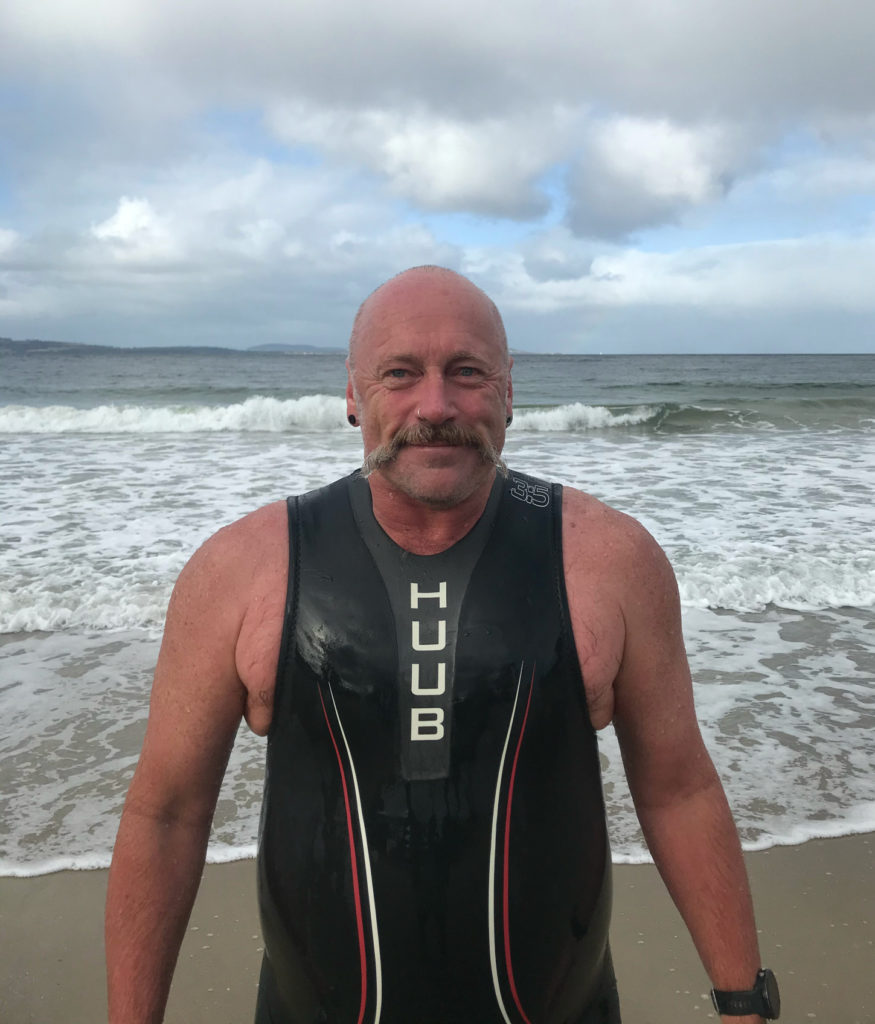Swimming Through the Depths of Winter
by Sarah Aitken

Ocean swimming in a Tasmanian winter is not for the faint-hearted. Yet there are a growing number of us doing it – sparked in part by pool closures during last year’s Covid restrictions.
It’s midday on a very cold day in late May. At Kingston Beach the sea spray is blowing all the way to the parked cars and behind them there is a decent covering of snow on the mountain. The very few walkers on the beach are decked out in a rainbow of Tasmanian tuxedos and even the dogs are mostly staying indoors.
The water looks less than inviting, matching the colour of the overcast sky. But Pete McKenna has just finished his swim, and he is grinning.
“Today it’s a little bit confused,” he laughs, indicating the choppy swell. “This time of year it is bracing when your head goes under water. For the first hundred metres it was difficult to breath because of the constriction on the chest and everything tightened up. But once that settles it’s quite lovely.”
Pete got into ocean swimming as part of his triathlon training, years ago. He was soon hooked on the space it gave him.
“Swimming is a wonderfully selfish act, he says. “It gives you a chance to be in your own headspace without outside distractions. Sometimes it is a meditation, a mantra of ‘hand enter, pull, hand enter, pull, hand enter, pull and breathe’. Sometimes it is a battle of wills against the elements where no rhythm can be found. Always, it is a fantastic experience.”
Pete is thrilled with the increase in ocean swimmers at Kingston and Blackmans Bay over the past year.
“It’s become like a highway of swimmers here, post-Covid. It has multiplied tenfold. If you come here on a Saturday at 8am there will be dozens here. People are really embracing it and making it a part of their lifestyle. And the local competitions have really started to take off – with lots more people participating, because they can now, they’ve pushed themselves and overcome that fear factor.”
Clearly the temperature doesn’t put these swimmers off – today the water is about 12 degrees whereas on dry land it’s around nine. But they won’t swim if the waves are too big, or if there has been enough rain to wash pollution down Brown’s River and through the stormwater drains into the sea.
“Yeah…at times when you swim down past it you can taste…things…in the water,” Pete says with a slight grimace. “It just tastes dirty. The two main things that get washed down there, according to the water quality guys, are dog faecal matter and motor oil, and sometimes you get a smoky taste when there have been burn offs. You become very aware of these things when you’re in it.”
When the sediments have settled they’re straight back out there enjoying themselves. Sometimes in groups but often individually. They come to need it, not quite finding the same effects through any other activity.

“It sets you up for the day,” says Pete. “Even if you are cold for the rest of the day! That’s a good reminder in itself of that time in nature.
“I come away from a swim feeling mentally and physically stronger. Sometimes it is difficult, sometimes it is easy but always I am grateful and happy.”

